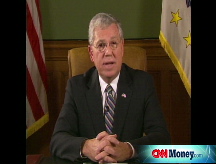Stories from the recession's frontline
Jobs. Foreclosures. Government cuts. The people of Rhode Island are feeling the pain and finding solutions. Here's what the recession looks like up close.

PROVIDENCE, R.I. (CNNMoney.com) -- Rhode Island is a tiny state with big problems. With just over one million residents, it ranks in the top 10 in terms of foreclosure, unemployment and state budget crunches.
CNNMoney.com traveled there in early January to witness the hard times up close. Over the next five days, we will use Rhode Island to illuminate the real economy on Main Street -- and give voice to kitchen table conversations across America -- as Washington debates how to get the nation back on track.
We will tell the stories of the jobless returning to school to learn new trades and the senior citizens feeling the pinch of state budget cuts.
We will talk to renters being evicted because their landlords are facing foreclosure and spend time with a community housing group hoping to use federal funds to turn around a neighborhood suffering from the mortgage meltdown.
And we will let Rhode Islanders tell you, in their own words, how they are coping.
Take Cheryl Smith-DuBois of Bristol. Her husband, a carpenter, is out of work and the couple is trying to scrape by on his unemployment and her job as a Mobil cashier. Looking to save every penny, she hardly gets to see her grandchild, who lives less than 15 minutes away, because she's trying to save on gas.
"It's hard to live within a box," said Smith-DuBois, 61.
Smith-DuBois' struggles and Rhode Island's plight are common. States around the country are reeling from one of the worst economic and financial crises since the Great Depression. As people lose their jobs and stores lose their customers, states are seeing their income and sales tax revenues dwindle. Declines in business profits only exacerbate the problem, driving down corporate tax revenues.
The confluence of these trends means many states are wrestling with multi-million budget deficits and cutting services and personnel.
Some 45 states faced or are predicting shortfalls in their budgets for this year or next, according to the Center on Budget and Policy Priorities, a Washington think tank. At least 41 states and the District of Columbia have mid-year budget gaps totaling $43 billion, or nearly 9% of their collective budgets.
"The picture will get worse, at least in the first half of 2009," said Robert Ward, deputy director of the Nelson A. Rockefeller Institute of Government. "Beyond that, we can hope that the picture starts to get better or at least stabilizes."
Rhode Island is scrambling to close a $350 million gap in its budget for the 2009 fiscal year, which began July 1. This shortfall comes after the state already slashed services and reduced personnel to plug a $425 million deficit in its $6.9 billion budget at the start of the fiscal year.
Last year, the state cut in half community service grants that assist the elderly, the youth and the poor; tightened the requirements for health coverage for low-income parents, and reduced funding for public colleges by $19.5 million, forcing them to hike tuition by as much as 10% for the fall semester and even more for the spring.
To deal with the mid-year gap, Gov. Donald Carcieri has proposed slicing 6% of aid to municipalities and eliminating some retirement benefits for state workers, such as the annual inflation adjustment. It is also depending on federal aid to see it through.
"I am very concerned that the economy is continuing to slide," said Carcieri in a televised address earlier this month. "While this plan closes the gap as of today, we could be facing more shortfalls by the end of this fiscal year."
Even without these state service cuts, Rhode Island residents are feeing the pain. As manufacturing and other jobs disappeared, the state's unemployment rate zoomed to 10% in December, the highest in more than three decades and more than double what it was a year ago. Its November rate of 9.3% was the second highest in the nation.
And homeowners, who enjoyed a meteoric rise in housing values during the real estate boom, are dealing with a 3.18% foreclosure rate, the 10th highest in the United States, according to the Mortgage Bankers Association.
Other states are also suffering in the economic downturn.
Michigan is coping with an unemployment rate of 10.6%, amid the auto industry's decline. Florida and Nevada, which have the highest number of homes in foreclosure at 7.3% and 5.6%, respectively, are trying to rebuild their housing markets.
And, during his annual State of the State address earlier this month, Gov. Arnold Schwarzenegger said California is "in a state of emergency" and faces insolvency within weeks in the wake of a projected $42 billion deficit.
Recognizing the dire straits of the states, President Barack Obama and congressional Democrats are planning to pump billions into their economies as part of an $825 billion stimulus package. States will get more money for a wide range of services, including education, senior nutrition and infrastructure projects.
"This recovery and reinvestment plan will provide immediate relief to states, workers, and families who are bearing the brunt of this recession," Obama said in a speech earlier this month. "Government at every level will have to tighten its belt, but we'll help struggling states avoid harmful budget cuts, as long as they take responsibility and use the money to maintain essential services like police, fire, education, and health care."
Tuesday: "Recession realities: Stories from the frontline" -- Unemployed workers go back to school for new careers.
How is your local economy affecting you? E-mail your story to http://jcmsprod14.turner.com:86mailto:realstories@cnnmoney.com and you could be included in an upcoming article. ![]()






